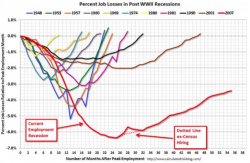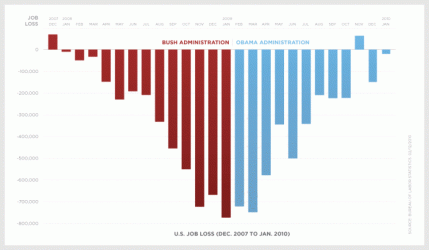Wehrwolfen
Senior Member
- May 22, 2012
- 2,750
- 340
- 48
Obama Did Not Inherit a Mess, But a Great Opportunity--Which He Wasted
by Joel B. Pollak
Obama Did Not Inherit a Mess, But a Great Opportunity--Which He Wasted
21 Oct 2012
President Barack Obama has often lamented that he inherited a mess from George. W. Bush. His opponents acknowledge that, but argue that Obama made the situation worse. Did they come in and inherit a tough situation? Absolutely. But were going in the wrong direction! Ryan said during the Vice Presidential debate on Oct. 11.
The truth, however, is otherwise: Obama inherited a fantastic set of political circumstances.
The economy was near the trough of the recession, and would likely have rebounded quickly, had Obama not intervened with radical new policies such as Obamacare and Dodd-Frank. Even allowing for the (disputed) argument that financial collapses lead to slower, longer recoveries, it is likely that the economy would have rebounded far more quickly had Obama not created new uncertainty, new business costs, and new debt.
The controversial bailouts--the Troubled Asset Relief Program and the auto bailout--were already under way, with the former passing Congress with bipartisan majorities and the latter initiated by Bush when Congress rejected it. Both of these massive expenditures, which also gave the government unprecedented economic control, could have been fodder for intense opposition under Obama--but he was spared the task.
On the war front, the Bush surge in Iraq--which Obama had opposed vigorously--had been a success, enabling Obama to devote more attention and resources to securing gains in Afghanistan. The key intelligence that would later be critical to locating Osama bin Laden had already been gathered, thanks to the capture in Iraq of Hassan Ghul and the waterboarding of Khalid Sheikh Mohammed--which Obama had also opposed.
There was little, in fact, that Obama needed to do, other than that which ought to have come naturally to any new President: focus on the economy, with small adjustments to regulations, perhaps a few interventions (Obamas original stimulus proposal was $50 billion), and maybe some appropriate prosecutions (which, curiously, never happened).
With the economy on the rebound, Obama would likely have coasted to re-election, and he could have used his second term to attempt more ambitious, transformative plans.
But Obama refused. He and his advisers chose to seize the crisis to implement radical changes, while his Democratic allies helped themselves to massive helpings of pork. The ill-fated stimulus of February 2009 rallied the opposition; the Obamacare push only galvanized it; and the 2010 midterm elections halted Obamas transformative plans.
President Obama had a second chance--many second chances, in fact. He could have done what Bill Clinton did after his party lost control of Congress in 1994, and moved toward the center. He could have brokered a grand bargain with Republicans to cut the deficit and the national debt, much as Clinton had done in 1996 with welfare reform. But Obama refused, doubling down on change and causing the debt deal to collapse.
[excerpt]








